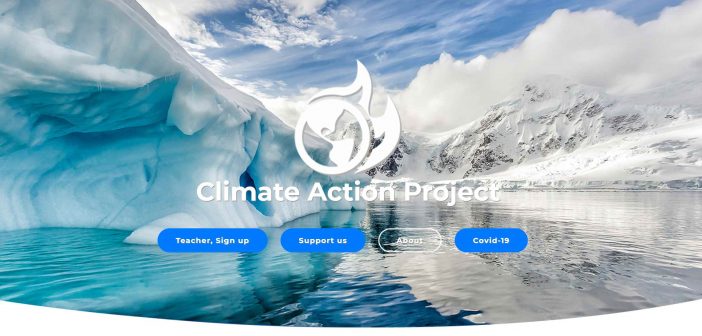Some topics are hard for even grown-ups to grasp. We may tackle Plastic-Free Challenges and more sustainable eating practices as individuals, but reversing climate change is still a major fight on multiple fronts.
But that’s for adults, right? Kids can’t do anything to save the Earth. They’re just kids.
That’s not what the Global Climate Change Action Project thinks. They created a worldwide project that “aims to change students’ behavior and societies’ mindset concerning climate change and environmental threats through education.” Students from all over the world participated in a six-week Climate Action Project which culminated in reporting on their results during a live webinar on the evening of November 5, Beijing time.

Directly after the organizers’ introductory remarks and a rousing speech by none other than nature historian Sir David Attenborough, two Keystone Academy fourth-grade students Amy Y. and Jeffrey Z. presented their own classes’ findings on tangible ways they can change the way we treat the planet, no matter how small.
Amy and Jeffrey began by defining climate change and investigating how it directly affects their lives in Beijing. With the guidance of their English teacher Mr. Reuben Bathgate and through comparing data, they realized the average annual temperature in Beijing has increased over recent years.
But again, the question arose. What can children do? Amy and Jeffrey’s class looked at their school life first and found a few different ways that students can help, which they described in detail to their live audience at this event:
- Meat-less Monday in the cafeteria because factory farming counts for 1/3 of carbon emissions annually,
- Check that all classrooms have paper recycling bins next to printers and trash receptacles. (My kids were watching with me and said they would ask their school about this as well).
- Their school has a greenhouse and gardens, where students are able to see how the cycle of life works in real-time: plants feed fish, fish feed plants, they can create compost to help feed their gardens, which in turn cultivates worms in compost to feed the fish.
- Many teachers switched to using Seesaw, Padlet, and Microsoft Teams to reduce paper consumption
- They are in the process of researching the viability of installing solar panels on school roofs, working with administrations across the departments to see how feasible it is.
- Students also shared how they felt about food wastage, and are still working to find solutions to this problem.
Both students were excellent representatives of the Beijing school community. It was clear they understood the topic, their material, and their investigations thoroughly. The organizers of the event emphasized accessibility for all involved, and students Amy and Jeffrey seamlessly moved between English and Mandarin in their presentation.
Their Grade 4 English teacher who facilitated the project, Mr. Reuben Bathgate was also quite proud of his students’ achievements:
It was a privilege to participate in the Global Climate Change Action project culminating webinar alongside such legends as Sir David Attenborough and Dr Jane Goodall. My students and I have come to admire them both so much as we learned about climate change and how they have dedicated their lives to taking care of our planet and the creatures that share it with us. We enjoyed the opportunity to collaborate with other students from around the world and learn how climate change has affected where they live and what they are trying to do to help make a difference. The most important thing we learned is that this is not a start-stop school project. Just because the unit has finished we won’t stop thinking about what we can do, and we won’t stop taking small actions each day, to make a positive impact on climate change and to help to save our planet for future generations.
Congratulations to Keystone Academy and their fourth-grade climate scientists for a — worldwide — job well done!
KEEP READING: Is Plastic-Free Possible for Parents? Involve Your Children so They Understand
Photos: Climate Action Project website




